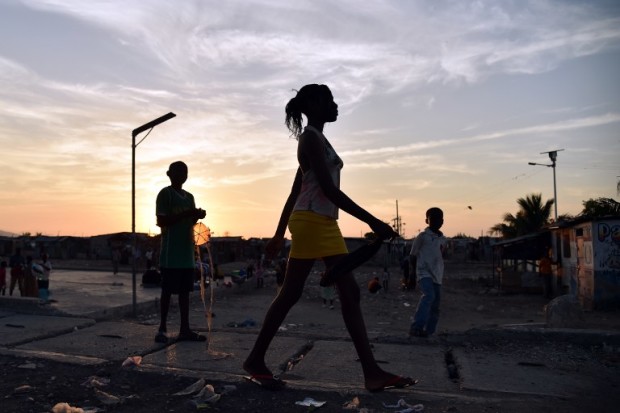
A child (L) plays with a kite beside Route Soleil 9 in the Cite Soleil commune of the Haitian capital, Port-au-Prince, on March 21, 2016. / AFP / HECTOR RETAMAL
Thirty youngsters exercise in a concrete yard, sharing four punching bags and a few pairs of gloves: this is boxing practice and it’s what hope looks like for youth in Haiti’s Cite Soleil slum.
“By training 200 children, you save the lives of 200 children,” said Jean-Bernard Belizaire, giving instructions to the group.
“Life is hard here and if they want to fight, they can get rid of their anger with boxing gloves instead of a gun in the street.”
A native of the poorest and most crowded slum in Haiti, Belizaire organizes daily workouts in the small space that includes a 20-square-meter room with no electricity or water. The 26-year-old gets paid nothing for his work.
Never a dollar
“No one gives us a dollar for support or to buy water, we work only with our courage,” said Belizaire, nicknamed Djaul.
In this notorious slum, the largest in the Caribbean, the story of Evens Pierre is the dream of many youth who call it home. Born and raised in the same crowded alleys, he’s now a world-class boxer who lives and trains in Panama.
The Haitian government provides little to nothing for the estimated 200,000 to 400,000 residents of Cite Soleil on the northern fridge the capital.
Despite promises by presidents who have made rare visits over the past 20 years, the shantytown still has no gym.
Charles Elie, 19, has never known the government to provide anything and doesn’t see a reason to complain.
Heroes in Cite Soleil
“Here I have everything I need. In Haiti, there is no state support, the (national boxing) federation helps as much as it can,” said the young national team member in the sweltering training room.
“I train because I need to do it. I want to be world champion and give Cite Soleil a hero.”
Pride in their neighborhood is a major motivation for the young boxers.
“Cite Soleil taught me to live. As a ghetto, Cite Soleil taught me to share. There are gangs, yes, but not everyone is part of one, ” Elie said.
Giving young people an alternative to crime is the mission of Sainte-Agnes Maximilien, who is 61 and grew up in Cite Soleil.
“There is a method of connecting with a street child. I do not take his hand, I just talk to him and invite him to come here,” she said. “Later he will come with another friend, and that’s how it works. I would prefer this to them dying in the streets.”
The struggle to survive in Cite Soleil draws many youth to a life of crime.
Back and forth
Thomas Noreille, who co-directed the 2014 documentary “Soley” about the slum’s young boxing hopefuls, saw that reality first-hand.
“Some of them go back and forth between boxing and gangs. The temptation is always there. Instead of having nothing to eat, when you have a weapon there is food to eat and food for the family,” said the Swiss director, who has lived in Haiti for several years.
“I have a huge admiration for them because they are virtuous. Although they are considered delinquents, they are much more honest than most people I know,” Noreille said.
Unfortunately, one of the young boxers featured in the documentary lost his fight against the troubles of the slum, shot to death in Cite Soleil before the filming wrapped.
“We are still waiting for a gym,” Noreille said. “I’m not saying this will fix all the problems in Haiti but it can really save some lives.”